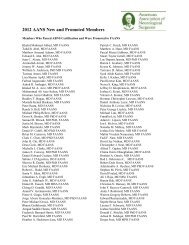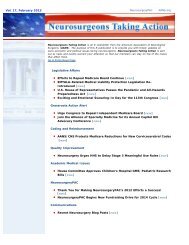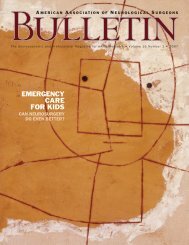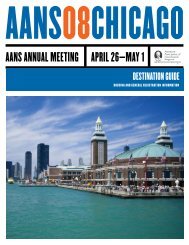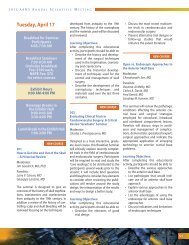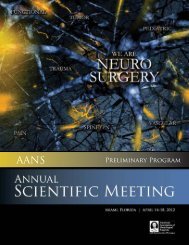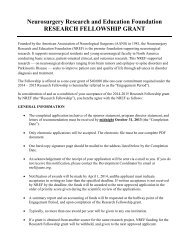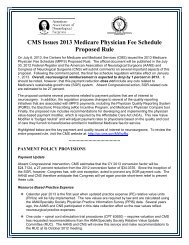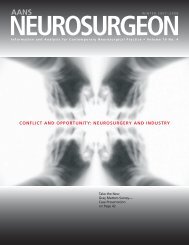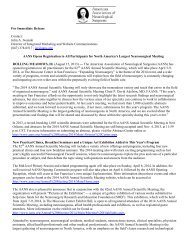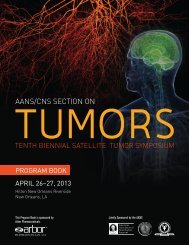view PDF - American Association of Neurological Surgeons
view PDF - American Association of Neurological Surgeons
view PDF - American Association of Neurological Surgeons
You also want an ePaper? Increase the reach of your titles
YUMPU automatically turns print PDFs into web optimized ePapers that Google loves.
B OOKSHELF G ARY V ANDER A RK, MD<br />
Too Much Like Ourselves<br />
Neurosurgeons Author Two New Books<br />
Another Day in the Frontal<br />
Lobe: A Brain Surgeon Exposes<br />
Life on the Inside, by Katrina<br />
Firlik, 2006, Random House,<br />
271 pp., $24.95.<br />
Leonard Wood: Rough Rider,<br />
Surgeon, Architect <strong>of</strong> <strong>American</strong><br />
Imperialism, by Jack McCallum,<br />
2006, New York University<br />
Press, 355 pp., $34.95.<br />
Neurosurgeons are writing books!<br />
Hot <strong>of</strong>f the presses are two new<br />
titles by Jack McCallum, MD, and<br />
Katrina Firlik, MD. McCallum,<br />
who is on the neurosurgery faculty at Baylor<br />
and also teaches history at the Texas<br />
Christian University, has written a scholarly<br />
biography <strong>of</strong> Leonard Wood; Firlik, a<br />
recent neurosurgical graduate from the<br />
University <strong>of</strong> Pittsburg, has published the<br />
story <strong>of</strong> her neurosurgical residency with<br />
the attention-getting moniker <strong>of</strong> Another<br />
Day in the Frontal Lobe.<br />
Firlik’s book is in the tradition <strong>of</strong> Rudy<br />
Giuliani and Erin Brockovich. Books that<br />
glorify the <strong>American</strong> dream come true have<br />
always found an audience, and Random<br />
House is betting that people will want to<br />
read the story <strong>of</strong> a woman from Harvey<br />
Cushing’s hometown who has made it in<br />
the male-dominated world <strong>of</strong> brain surgery.<br />
Firlik has a gift for making neurosurgery<br />
sound intriguing. The book begins<br />
with this attention grabber: “The brain is<br />
s<strong>of</strong>t. Some <strong>of</strong> my colleagues compare its<br />
consistency to toothpaste, but that’s not<br />
quite right. T<strong>of</strong>u—the s<strong>of</strong>t variety, for those<br />
knowledgeable about t<strong>of</strong>u—may be a more<br />
accurate comparison.” Neurosurgeons will<br />
probably not find this book as fascinating<br />
as some <strong>of</strong> our patients might.<br />
McCallum says <strong>of</strong> Leonard Wood,<br />
“Today, were it not for an army base that<br />
bears his name, we would never hear <strong>of</strong><br />
Leonard Wood.” For neurosurgeons, that<br />
may not be true. Those <strong>of</strong> us who have read<br />
Cushing biographies by John Fulton and<br />
more recently by Michael Bliss know<br />
Leonard Wood as a famous patient. McCallum<br />
sets the record straight as to Wood’s<br />
medical history, but does much more in<br />
allowing us to know the doctor who<br />
became a soldier.<br />
Leonard Wood was born Oct. 9, 1860, in<br />
Pocasset, Mass., and died in the operating<br />
room at Boston’s Peter Bent Brigham Hospital<br />
at 1:50 a.m., Aug. 6, 1927. The 1880s<br />
were the decade in which <strong>American</strong> medicine<br />
transformed itself from a cult to a science,<br />
and Harvard Medical School, where<br />
Wood framed as a physician, was the nexus<br />
<strong>of</strong> that revolution. But Wood enlisted as a<br />
military surgeon and became a soldier<br />
more than a doctor. His medical background,<br />
however, had pr<strong>of</strong>ound influence<br />
on his legacy as an administrator.<br />
Wood’s first military experience was<br />
chasing Geronimo, and he won the Medal<br />
<strong>of</strong> Honor just as Frederick Jackson Turner<br />
declared the <strong>American</strong> frontier closed. He<br />
spent a year as Georgia Tech’s first football<br />
coach before moving to Washington where<br />
he developed a lifelong friendship with the<br />
assistant secretary <strong>of</strong> the U.S. Navy,<br />
Theodore Roosevelt.<br />
Leonard Wood’s conversion from physician<br />
to pr<strong>of</strong>essional soldier was completed<br />
when Roosevelt convinced President<br />
McKinley that a cowboy regiment should<br />
join the Spanish War. The Rough Riders<br />
were a combination <strong>of</strong> Wood’s western contacts<br />
plus Roosevelt’s assortment <strong>of</strong> Ivy<br />
League ex-athletes. When the war ended,<br />
Wood accomplished great things as a natural<br />
administrator and a zealous autocrat.<br />
Within one year, he was military governor <strong>of</strong><br />
Cuba. The crowning achievement <strong>of</strong> all his<br />
Firlik’s book is in the<br />
tradition <strong>of</strong> Rudy Giuliani<br />
and Erin Brockovich.<br />
Books that glorify the<br />
<strong>American</strong> dream come<br />
true have always found<br />
an audience….<br />
training was funding and taking responsibility<br />
for Walter Reed’s yellow fever experiments<br />
and authorizing William Gorgas to<br />
use the finding to virtually eradicate yellow<br />
fever and malaria from Cuba.<br />
The later chapters <strong>of</strong> Wood’s life as military<br />
commander and governor general <strong>of</strong><br />
the Philippines were not as successful.<br />
Wood had a dark side and at times his disdain<br />
descended to cruelty and even murder.<br />
Wood at his best was altruistic,<br />
intelligent, creative, self-confident and<br />
indefatigable. On the other had, he was<br />
intolerably self-righteous and his insatiable<br />
appetite for power culminated in his<br />
unsuccessful run for the U.S. presidency.<br />
McCallum <strong>of</strong>fers an interesting conclusion<br />
in the epilogue <strong>of</strong> his book:“In the end<br />
… Wood never quite discovered how to<br />
fulfill himself or to satisfy others in the<br />
exertion <strong>of</strong> his own remarkable powers.<br />
Perhaps we have forgotten him because he<br />
was too much like ourselves.”<br />
Ah, there’s the rub.<br />
Here you have two new books by fellow<br />
neurosurgeons. Both <strong>of</strong> these books will<br />
serve as mirrors, and both will help us to<br />
understand ourselves better. 3<br />
Gary Vander Ark, MD, is director <strong>of</strong> the Neurosurgery<br />
Residency Program at the University <strong>of</strong> Colorado. He is<br />
the 2001 recipient <strong>of</strong> the AANS Humanitarian Award.<br />
40 Vol. 15, No. 2 • 2006 • AANS Bulletin



